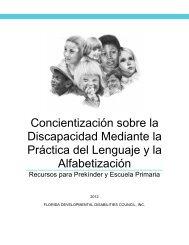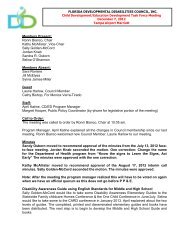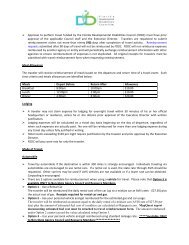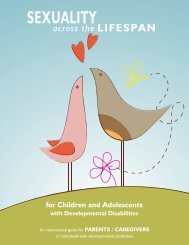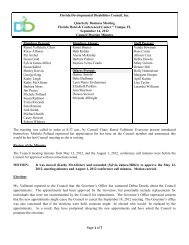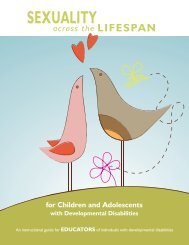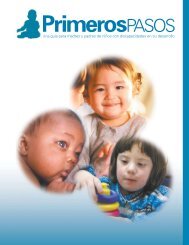Planning Ahead - Florida Developmental Disabilities Council
Planning Ahead - Florida Developmental Disabilities Council
Planning Ahead - Florida Developmental Disabilities Council
- No tags were found...
You also want an ePaper? Increase the reach of your titles
YUMPU automatically turns print PDFs into web optimized ePapers that Google loves.
with the ward regarding his wishes, and allow the ward to participate as fully as possible in makingthe decisions affecting him.Four areas in which persons with developmental disabilities are most likely to have difficultyand require a guardian are:• Consenting to medical, dental and surgical procedures;• Managing money or property;• Applying for governmental benefits and entitlement; and• Deciding on residential choices.LAWS IN FLORIDA WHICH ADDRESS GUARDIANSHIPChapter 393, F.S., <strong>Developmental</strong> <strong>Disabilities</strong>, is specifically designed to determine the degree ofincapacity and to meet the unique needs of persons with developmental disabilities. This specialtype of guardianship is addressed in section 393.12, F.S., and the guardian is called a guardianadvocate. Even though the name is different from the name “guardian” given in Chapter 744,F.S., the authority given by the court is the same.A petition is filed asking that a guardian advocate be appointed to perform those rights that thedevelopmentally disabled person cannot perform. Attached to this petition are reports, evaluations,support plans, individual education plans, and/or habilitation plans which indicate thedegree and areas of incapacity.This statute does not require a separate hearing to determine incapacity, and there is no adjudicationof incapacity. In fact, Section 393.12, F.S., specifically denies requirements for an adjudicationof incompetence. It also dictates that the hearing must be conducted in a mannerconsistent with due process. At the hearing to appoint the guardian advocate, the Circuit Courtreviews the reports, evaluations and support plans submitted by the petitioner(s), and appointsa guardian advocate to perform those functions that the person is unable to perform. Onlythose rights the person cannot managed are removed.This is the least restrictive, less costly and much preferred type of guardianship for personswith developmental disabilities because it offers the following procedural and financialadvantages:• The appropriate professionals are used to evaluate the individual, determine thedegree of incapacity and identify rights that should be removed. These are professionalswho have knowledge of the disability and the individual as well as theperson’s potential for improvement through training.• Existing plans identifying needs (support plan, individual education plan, or habilitationplan) may be used to identify service needs related to rights the individualcannot handle. Each client of the Agency for Persons with <strong>Disabilities</strong> has a supportplan developed by appropriate professionals who know the person.• The professional evaluation is completed by the Agency for Persons with <strong>Disabilities</strong>as part of the determination of eligibility for the program at no cost to the applicant.There is not an examining committee of 3 professionals as is required in Ch.744, thus reducing this cost.• This process consumes less court time, reducing the cost to courts and attorneys.Chapter 8, Legal Ways of Protecting Rights39



